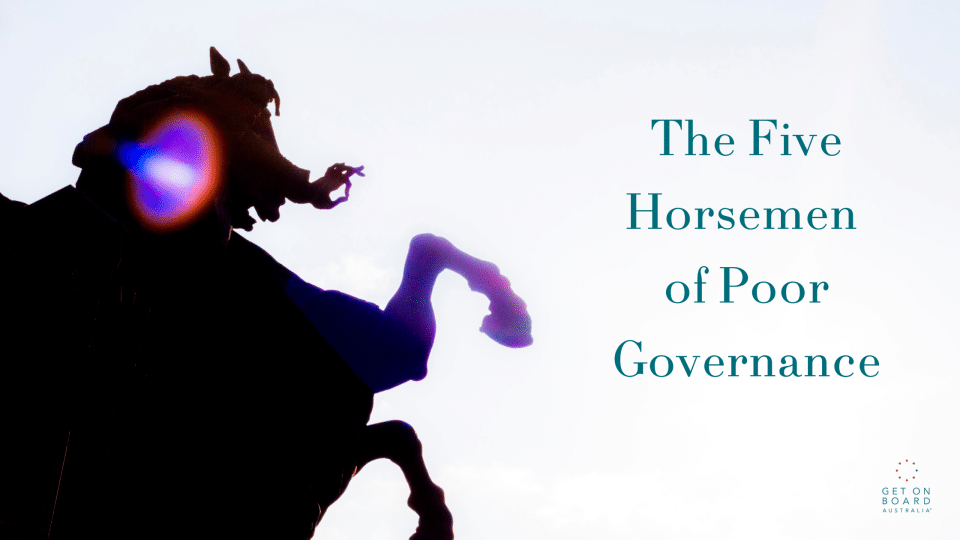The Five Horsemen of Poor Governance

In my last article, I wrote about ‘good governance’, which as we now know, is an ambiguous term meaning different things depending on the context in which ‘good’ is being judged. And, most importantly, a lot of what makes governance actions either good or bad comes back to the people governing an organisation.
As an extension of this theory, let’s now turn our attention to ‘bad’ governance. Or, rather, the behaviours of individual people that result in negative outcomes for them, the board, and/or the organisation.
When we talk about corporate governance being ‘good’ or ‘bad’ we mostly refer to the outcomes of corporate governance actions and behaviours. Those things that we can point to and usually quantify: the business continues (or fails), the financial position is strong (or weak), the share price (for public companies) is at expected levels (or isn’t), and there is no crisis (or there is).
Whilst these positive outcomes are very important outcomes for any organisation to realise, they don’t always mean that the board’s corporate governance practices are ‘good’. The outcomes listed above can and do come about despite the behaviours of board members.
Say what?!
Yep, there are a lot of factors that play into an organisation’s success or failure; the board’s behaviours are just one of those factors. Nonetheless, they are a VERY important factor. Great boards can and do tilt the odds in favour of the organisation achieving its goals, whatever those are determined to be.
Naturally, boards populated with individuals who don’t appreciate and respect their important governance role, are at a higher risk of realising negative corporate outcomes and getting themselves in a not-so-great situation.
Sometimes boards find themselves in a negative situation and wonder how they ended up there. If the actions of individual board members leading up to this negative situation are reflected upon, it is obvious why and how they’ve ended up in the proverbial.
Many of these individual actions are initially covert but end up becoming pervasive due to the self-indulgent view of their own importance held by some board members. This can quickly permeate and become the board culture (due to a number of factors beyond the scope of this article). These behaviours are what I have called ‘The Five Horsemen of Poor Governance’1 and is borrowed from the work of Jenson and Meckling.2 They prophesise the coming of bad things if allowed to persist in the boardroom.
This approach follows the economic theory that people, including board members (or anyone in position of authority or discretion), are wealth maximisers.3 Therefore, “rationally”, board members are going to act in their own interests (which, as you know, they’re actually supposed to act in the best interests of the organisation).
Because of this tendency towards self-interest, board members will tend to do one or more of the following:
- Shirk: avoiding or neglecting a duty or responsibility; being unwilling to do something (think, chronic non-attendance at board meetings, non-participation in board committees, and lack of attendance at events, to name a few).
- Empire-build: the pursuit to enlarge the size, scope, and influence of an individual (for example, those board members who actively work to build a coalition around them to secure their role on the board and/or gain the Chair/President position).
- Make claims for more income: ask for an increase to director remuneration (if board members are paid).
- Increase non-transparent perquisites: access to additional fringe benefits over and above remuneration (even for volunteer board members; for example, free drinks at the bar, paying for personal travel, and claiming meeting expenses for unrelated meetings). And/or
- Take risks in excess of the board’s risk appetite: Push the limits of organisation resources beyond the collective comfort zone set by the Board (consider a board member aggressively pushing a particular investment strategy – like bitcoin – with the view for the organisation to ‘get rich quick’).
If you see any of these horsemen riding into your boardroom (i.e. you see these behaviours amongst your board members), it is a sign that bad things are coming! Some may even be unaware of what they are doing and just think it’s the normal course of business of board members to, for example, politicise their role on the board, or ask for a remuneration increase, or use company money to pay for unrelated activities. It’s just part of our ‘culture’; it’s how we do things around here.
Left unaddressed, these behaviours will lead to ‘bad’ corporate governance and negative outcomes for an organisation.
To counteract these horsemen arriving in your boardroom, find ways to monitor board members (through internal and external ‘audits’, and performance reviews); and find ways to align the board members’ personal interests with those of the organisation (for example, by board members owning company shares). And, remain ever vigilant to slipping standards and questionable behaviours being shrugged off as ‘that’s how we’ve always done things.’
